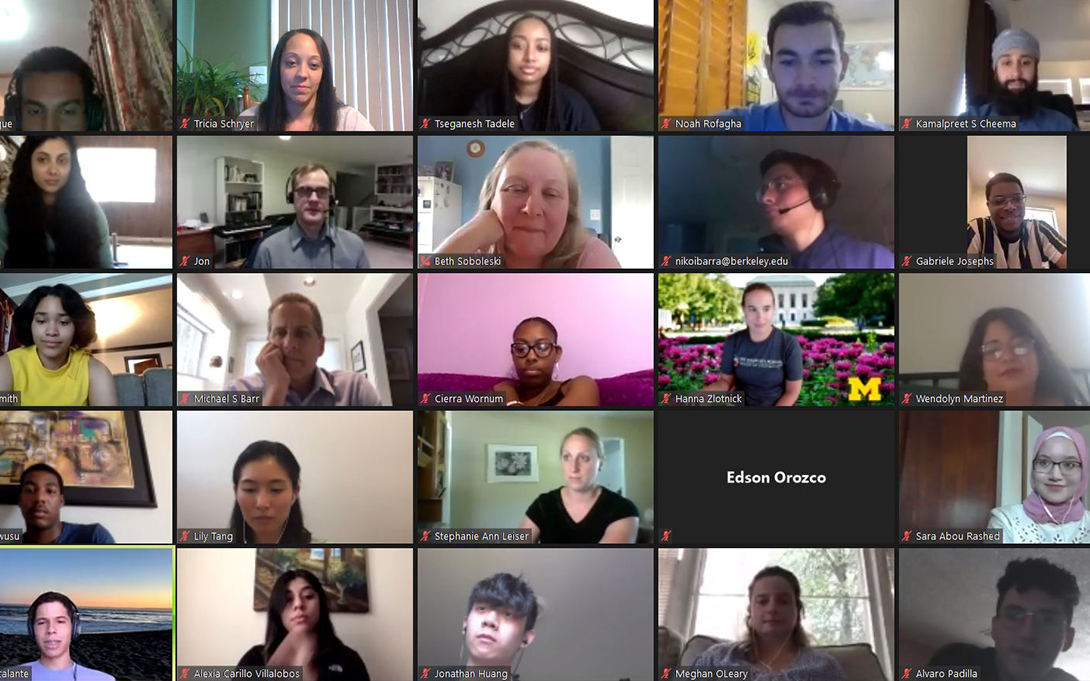
The Public Policy and International Affairs (PPIA) Junior Summer Institute (JSI) is entering its 40th year after a summer of adjustment and innovation. The intensive seven-week summer program focuses on preparing diverse undergraduate students for graduate programs in public policy and international affairs.
The program has been particularly relevant for the Ford School. A record 12 PPIA alums are in the incoming MPP class in 2020, and some 150 PPIA alumni have gotten their degrees from the Ford School.
In the summer of 2020, as COVID-19 pandemic restrictions meant that students could not attend in person in Ann Arbor, the program needed to do more than just move online.
“One of the benefits of being online was the ability to connect a little more easily with students in the programs at the other universities. Liz Gerber was able to lead her ViewPoint policy simulation for all of the schools, which is the first time everybody has been able to participate together,” says Beth Soboleski, Ford School associate director of Student & Academic Services. Robert Hampshire also made his panel on transportation available to students at the other schools.
Ford is one of five schools that host JSIs. The other four schools are the Humphrey School of Public Affairs at the University of Minnesota, Heinz College at Carnegie Mellon University, Princeton University, and the Goldman School of Public Policy at the University of California Berkeley.
“In discussion with the other four schools, I want us to continue having some connection across all of them,” says Soboleski.
Another facet of the annual program is a PPIA Expo, which normally takes place in Washington, DC, and introduces students to their peers, PPIA alumni, and policy experts. For 2020, though virtual, every student was able to attend.
The students themselves were able to create their social as well as academic networks despite not being physically together.
“Outside of the academic programming, we set weekly time aside for them, for socializing. They did that, plus their own programming. They would have their own Zoom or chat sessions at 10 or 11 o'clock at night. I definitely think it's going to change some of the format of the program going forward,” says Tricia Schryer, recruiting and PPIA coordinator.
Noah Rofagha from UC-Berkeley says, “I thought it would be difficult to build relationships, but actually was wrong because there were only 24 of us. You're spending all this time with the same people in the same classes and you actually get to learn about them and what their interests are. Although it's not in person, we had small zoom events ourselves like after class, ust to get to know about each other more.”
“I got a lot out of this program and hope to take what I have learned to pursue my education in public policy,” says UC-Riverside student Alexia Carrillo-Villalobos. “Although we do not know what will happen with everything going on, I have been able to connect with the people I have met and seek advice on the process of graduate school.”
And the experience continues. Niko Ibarra, also from Berkeley, says, “Some people from my cohort are thinking about taking a trip to Ann Arbor, trying to see if we can get together after this whole pandemic is over. We have a GroupMe as well as a WhatsApp chat, and we check in with each other and share memes, and share resources.”
Simone Gbolo, the national PPIA director, based at the Humphrey School, says the 2020 session fulfilled its mission to increase diversity, equity and inclusion in public policy, and served the 135 students well. “It reminded me of the strength of our network, and the strength of our partners. They rose to the challenge,” she says.